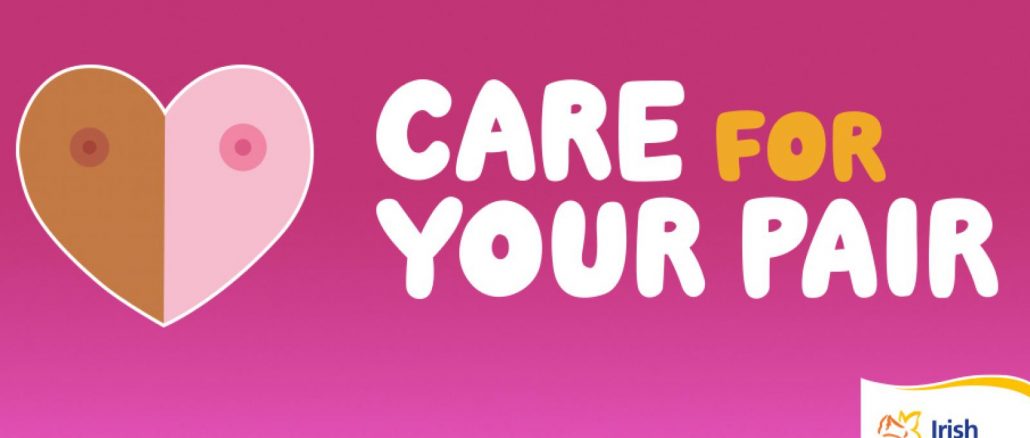
“[dropcap]I[/dropcap]t’s sea blue. It’s that feeling of sometimes you’re drowning. It’s there and it goes on forever.”
This is breast cancer ambassador Mary Bodley’s testimony when asked what colour represents her breast cancer journey. Since the 1990s, the colour pink has become synonymous with breast cancer awareness. However, this feminine, vivacious colour-association is not one all breast cancer patients can resonate with.
If anything, some women choose darker colours, connoting fear, despondency and grief, with a second breast cancer ambassador pinning red as her colour, “because it screams fear”.
As October marks Breast Cancer Awareness month, the Marie Keating Foundation has launched a new campaign to push beyond this pink – and often alienating – association.
Breast Cancer Isn’t Just Pink aims to highlight the uniqueness of each patients’ journey, while also emphasising the importance of regular breast cancer screening, a service that many have referred to as the “forgotten C” in the wake of COVID-19 restrictions.
Cancer becoming a casualty of the pandemic is a sentiment echoed by Senator Erin McGreehan. Earlier this month, Senator McGreehan led a campaign at the Oireachtas calling on the Department of Health to roll out an increased awareness campaign around breast health:
“We know that early detection saves lives and a full population wide awareness programme will change outcomes. I ask that the Department funds an increased awareness campaign by running national adverts on TV, social media and in print, reminding people to check for changes in their breasts and to show people how to check for changes.”
A major feature in Senator McGreehan’s campaign is the proposal to lower the age of screening to 40, from where it currently stands at 50.
This is particularly relevant, as according to Breast Cancer Ireland, 23 per cent of women diagnosed are between 20 to 50 years old. And while the assumption often lies with breast cancer only occurring in older cohorts, the death of high-profile English singer and actor Sarah Harding from metastatic breast cancer at age 39, sounded the alarm for women who presumed they were ‘too young’ to develop the illness.
In excerpts from the former Girls Aloud singer’s memoir, Harding spoke of how she put off seeking medical attention due to the pandemic, after she noticed a painful lump on her breast. This, coupled with her consideration that she was too young to develop the disease, meant her diagnosis was delayed.
This pandemic-led hesitation is reflected in the number of mammograms carried out by the HSE’s BreastCheck screening programme falling by more than two-thirds in 2020, leading to the detection of 600 fewer breast cancers.
While one in 9 women will develop breast cancer and 3,700 new cases are diagnosed annually according to Breast Cancer Ireland, the 2020 figures skew this data.
The aftermath of COVID-19 restrictions means the usual screening time of once every two years has now been extended to once every three years, with women who have been waiting the longest receiving their appointments first.
In response to this, the Irish Cancer Society has encouraged women to perform their own regular breast examinations and to encourage two friends to do the same, in its Care for your Pair campaign.
Performing these checks means being aware of the following common symptoms: A change in the size or shape of one breast; swelling in your armpit or around your collarbone; a lump, any size, or thickening in your breast; or constant pain in one part of your breast or armpit.
The HSE supports this awareness campaign through its media initiative launched as part of Breast Cancer Awareness month. This is following an additional 10 million funding for cancer screening, announced by Minister for Health Stephen Donnelly earlier this year.
While the BreastCheck screening service may be undermined, these new developments will work to ensure women will soon resume their screening appointments every two years; a commitment the HSE seeks to meet to ensure breast cancer doesn’t become the collateral damage of pandemic restrictions.
A list of symptoms, along with a guided video on how to perform a breast self-examination are included in the free Breast Aware app, by Breast Cancer Ireland. Viewing the BreastCheck register and screening updates can be accessed through breastcheck.ie. Women can also contact Freephone 1800 45 45 55 or info@breastcheck.ie.
Trudy Feenane
Image credit: Irish Cancer Society



